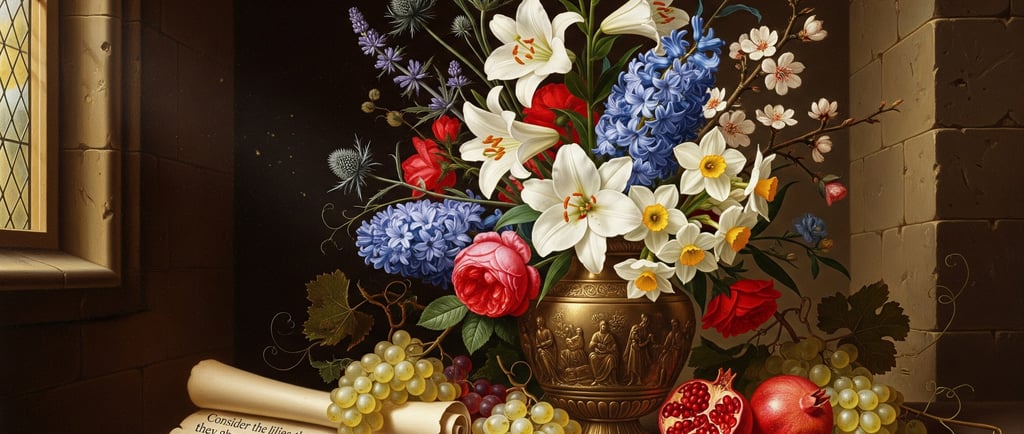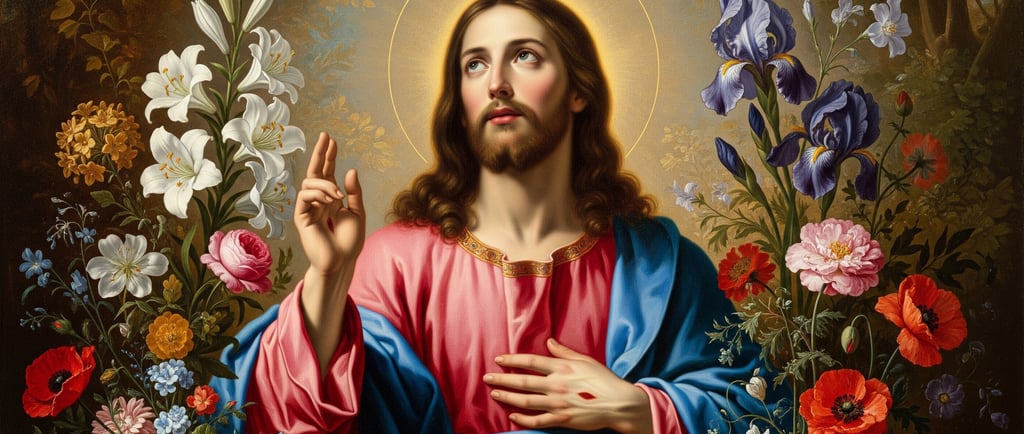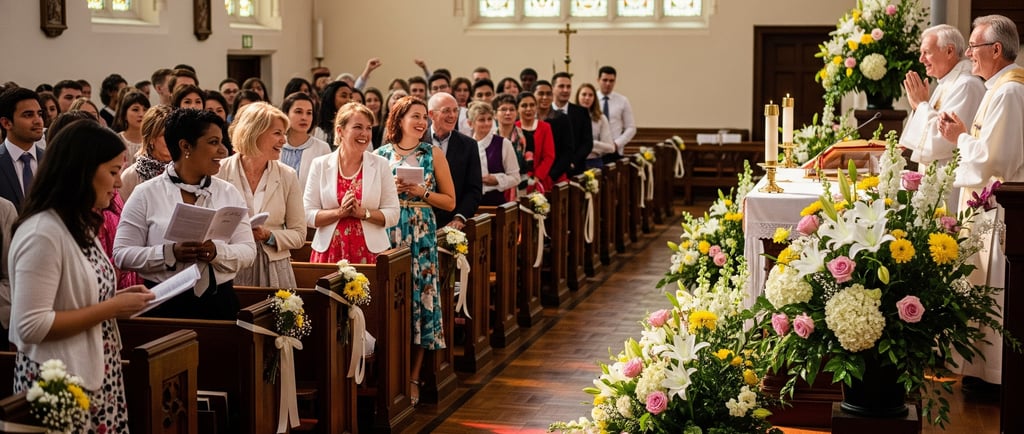Flowers And God: What They Can Teach Us
Have you ever stopped to consider the quiet confidence of a single lily? In one of his most profound teachings, Jesus points to the "lilies of the field" to offer a powerful lesson on divine provision. This isn't just a sweet thought; it’s a direct challenge to our daily anxiety. If God so beautifully clothes the flowers, won't He much more care for you?
9/2/20255 min read


Honestly, have you ever just stopped to really look at a flower? I mean, beyond a quick glance. I’m not just talking about the perfectly arranged bouquet you might grab from the florist, but a single wildflower pushing its way up through a crack in the pavement. Or maybe the way a single lily stands so straight and proud, its petals unfolding with a sort of quiet confidence. It’s a little crazy, isn’t it? This delicate, beautiful thing that doesn't work, doesn’t worry, and yet, it’s arrayed in a splendor that would make even a king like Solomon feel a little underdressed.
This simple, everyday truth is the heart of one of Jesus' most profound teachings. In Matthew, Chapter 6, He points to the lilies of the field and asks a powerful question: if God so lavishly clothes the flowers—which are here today and gone tomorrow—won't He much more clothe you? It's a rhetorical question, of course, because the answer is a resounding "yes." But it's more than just a sweet, sentimental thought. It’s a complete spiritual game-changer. It's a call to let go of our relentless anxiety, our constant fretting about what we'll eat, what we'll wear, or how we’ll make it to the end of the month. It’s a lesson in divine provision.


Why We Can Stop Worrying and Start Living
You know, it's so easy to get caught up in the hustle. We live in a world that tells us our worth is directly tied to our productivity. Our to-do lists are a mile long, and our minds are a constant whirlwind of deadlines, bills, and responsibilities. And when that weight piles up, it can feel overwhelming. We've all been there, running on our own steam until we're running on empty. But here’s the thing: flowers don't grind. They don’t hustle. They simply exist and, in doing so, they testify to God’s faithfulness.
This isn’t to say we should sit back and do nothing. That’s a common misconception. God’s provision often works through our effort, our jobs, and our relationships. The difference is the source of our security. Instead of depending on our own strength and wit to "make it," we lean into a deeper truth: that God, our Heavenly Father, knows exactly what we need before we even ask. He’s already taken care of the details. And the beauty He gives to a flower is a testament to the beautiful, abundant life He wants for us, too. This isn't just about survival; it's about thriving.


More Than Just a Pretty Face: Deeper Lessons from God’s Garden
Beyond the lesson on worry, flowers in the Bible serve as powerful metaphors for a whole host of spiritual truths. Let me explain. You see, the Bible is a masterclass in symbolism, and flowers are a recurring motif. From the delicate grace of a lily to the fleeting beauty of grass, they are used to highlight life’s most important realities.
1. The Frailty of Life and the Endurance of God’s Word.
The grass withers, the flower fades, but the word of our God stands forever (Isaiah 40:8). It’s a stark, powerful reminder of our own mortality. We are like flowers—beautiful, vibrant, but ultimately temporary. Our accomplishments, our earthly possessions, and our fleeting moments of glory will all fade. Yet, God's Word, His truth, and His promises are eternal and unchanging. This is a humbling truth that should shift our focus from temporary treasures to eternal ones.
2. The Transformative Power of Grace.
Consider the symbolism of the rose. Often associated with love, it reminds us of Christ’s love and sacrifice. Or think about the Easter Lily, blooming in spring as a powerful symbol of resurrection and new life. Flowers don't just exist; they transform. They go from a bud to a bloom, a testament to the renewal and spiritual rebirth available to us through Christ. This isn't just a process of change; it's a profound, spiritual blossoming.
3. Humility and Dependence.
A flower is entirely dependent on external forces to thrive. It needs the rain from the clouds and the sun's warmth. It doesn't, or can't, provide for itself. In the same way, we are utterly dependent on God. Our pride tells us we can go it alone, that we can succeed on our own merit. But the silent testimony of the flower calls our bluff. It teaches us to be humble and fully reliant on our Creator for our growth and sustenance.


A Little Bit of Beauty for Our Burden-Filled Lives
I was reading a devotion recently that mentioned a study from Rutgers University, and get this: just looking at flowers can improve emotional health and increase feelings of life satisfaction. Isn't that wild? It's like God's creation has a built-in healing mechanism. We don't have to earn it or work for it. He's just given us this beautiful, simple thing to bring us joy and peace.
So, next time you're feeling overwhelmed, anxious, or just plain stressed out, take a moment. Walk outside and find a flower. Let its intricate design and effortless beauty be a gentle nudge from above. Let it be a reminder that you are worth so much more than the grass and the lilies. He's already shown us His ultimate provision through His Son, Jesus. And if He cares for them, how much more does He care for you, His beloved child? He's not just a God of survival; He's a God of splendor.


FAQs: Flowers and God
Is it okay to worry sometimes?
Of course, it is. We’re human. Worry and anxiety are part of the human experience in a fallen world. The point of the teaching isn't to scold us for worrying, but to remind us of where our ultimate security and peace lie. It's an invitation to shift our perspective from our own limited resources to God's infinite, loving provision. We can bring our worries to Him, casting our anxieties on Him because He genuinely cares for us.
Are all flowers mentioned in the Bible?
Not all flowers are specifically mentioned, but many are. Lilies, roses, and hyssop are some of the most notable. These flowers are used symbolically to teach us about God's character and our relationship with Him. The Bible uses common, everyday things to convey profound, spiritual truths, and flowers are a perfect example of that.
How does this apply to my daily life?
This lesson applies in every area of your life. When you're facing a job interview, a financial setback, or a health scare, the message remains the same: trust God. Don't let worry consume you. Instead, seek His kingdom and His righteousness first, knowing that He will faithfully provide what you need. Take a lesson from the flowers and surrender your burdens to a God who is both attentive and abundant.
Elegance
Fresh Flowers, Lasting Memories
Order
© 2024. All rights reserved.
